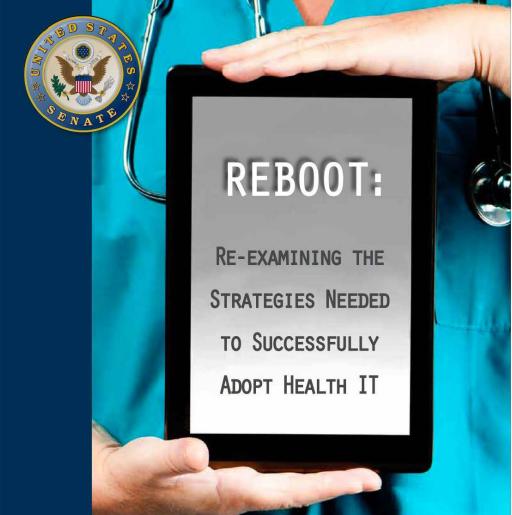 Vendor-led Association Comments on GOP Senators Concerns
Vendor-led Association Comments on GOP Senators Concerns
Responses to the release last month of a public letter and white paper from a group of six Republican Senators continue to make news. Last week HIMSS Electronic Health Record Association (EHRA) released public comments addressing the five major concerns outlined in the Senators’ white paper, Reboot: Re-examining the Strategies Needed to Successfully Adopt Health IT, including the current state of interoperability and how the billions allocated under the HITECH Act have been spent to date.
In EHRA’s May 16 letter, the vendor-led association acknowledges the Senators concerns:
As EHR developers with employees and users on the front lines of healthcare delivery through the adoption and use of health IT, we understand very well the five concerns you address. We agree that in order for providers to best leverage health IT towards the aims of meaningful use and interoperability, Congress and the administration as well as providers and health IT developers will have to work together closely.
In addressing the Senators five primary issues, EHRA provides both responses and offers up recommendations including reiterating the position that Stage 3 not start until three years after the start of Stage 2, or 2017. Here is sampling of the association’s response to each issue:
Issue 1 – Lack of Clear Path Toward Interoperability
We believe that Stage 1 established an important foundation for interoperability, and Stage 2 substantially accelerates this progress through increased rigor in standards, certification criteria, and meaningful use measures for clinical summaries, vocabularies, and data transport across providers and EHRs at transitions of care. For Stage 3, we recommend a more dedicated focus on care coordination and outcomes improvement requiring interoperable EHRs instead of some of the focus on broader feature/function capabilities included in the Stage 2 program.
Issue 2 – Increased Costs
Although the cost of care delivery is a critical consideration in healthcare reform, we do not believe that data shows that EHRs or health IT have led to inappropriate or inaccurate coding or ordering of unnecessary care.
Issue 3 – Lack of Oversight
CMS has been conducting extensive post-payment audits and has recently initiated pre-payment audits, and the EHR Association is not aware of any evidence of widespread or significant instances of payments that were not warranted. Additionally, Stage 2 certification applies stricter tests of EHR capabilities for meaningful use and quality measure reporting.
Issue 4 – Patient Privacy at Risk
Overall, we believe that the combination of HIPAA requirements, which are incorporated by reference into meaningful use, as well as the technical security requirements built into product certification, provide an appropriate approach to privacy and security in the EHR incentive program. Moreover, HIPAA provisions fully apply to providers whether they pursue meaningful use or not.
Issue 5 – Program Sustainability
In our comments to CMS and ONC on the Policy Committee’s proposed approach to Stage 3, we emphasized the need to learn from Stages 1 and 2 and allow sufficient time between when the Stage 3 Final Rules and associated specifications and supporting documents are available and the new stage starts. Given timing realities, we urge that CMS and ONC not start Stage 3 for at least three years after the start of Stage 2.
Read the complete HIMSS EHRA response here.
